Updates from old friends and dear readers
Compiled and edited by Veronica M. Berounsky
(What have you been up to? Please, click here to drop us a line.)
1970s | 1980s | 1990s | 2000s | 2010s | 2020s | In Memoriam
1970s
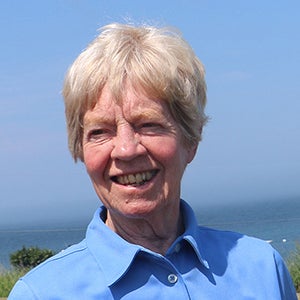 There was a strong GSO presence at the New England Estuarine Research Society (NEERS) Fall meeting which kicked off (virtually, due to COVID 19 restrictions) October 15, 2020 with a symposium entitled: “Anthropocene challenges, Long-term trends, and Pandemic-imposed reflections”. The welcome was given by GSO’s new Dean, Paula Bontempi (Ph.D. 2001), and one of the invited symposium speakers was GSO professor Candace Oviatt (Ph.D. 1967) who spoke on “A tale of two blooms in Narragansett Bay: how managed nutrient reduction and storm nutrient inputs impact primary production, commercial species and summer hypoxia”. The meeting was hosted by GSO and organized by GSO alums Veronica Berounsky (Ph.D. 1990), Walter Berry (Ph.D. 1987), Autumn Oczkowski (Ph.D. 2009) and doctoral student Kristin Huizinga.
There was a strong GSO presence at the New England Estuarine Research Society (NEERS) Fall meeting which kicked off (virtually, due to COVID 19 restrictions) October 15, 2020 with a symposium entitled: “Anthropocene challenges, Long-term trends, and Pandemic-imposed reflections”. The welcome was given by GSO’s new Dean, Paula Bontempi (Ph.D. 2001), and one of the invited symposium speakers was GSO professor Candace Oviatt (Ph.D. 1967) who spoke on “A tale of two blooms in Narragansett Bay: how managed nutrient reduction and storm nutrient inputs impact primary production, commercial species and summer hypoxia”. The meeting was hosted by GSO and organized by GSO alums Veronica Berounsky (Ph.D. 1990), Walter Berry (Ph.D. 1987), Autumn Oczkowski (Ph.D. 2009) and doctoral student Kristin Huizinga.
After 34 years of teaching at Cornell University, William M. White (Ph.D. 1977) retired this past summer but continues with research and revising his “Isotope Geochemistry” text for a second edition.
 Andrew Morang (M.S. 1978) reports: “Retirement is great. During the virus semi-shutdown, I have been exploring the Mississippi Delta and eastern Louisiana to photograph old towns, country stores, and abandoned farmhouses.”
Andrew Morang (M.S. 1978) reports: “Retirement is great. During the virus semi-shutdown, I have been exploring the Mississippi Delta and eastern Louisiana to photograph old towns, country stores, and abandoned farmhouses.”
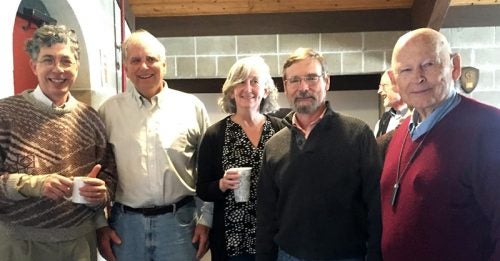
On Friday, February 28, 2020 the GSO Physical Oceanography Seminar, “Ocean salinity and machine learning for improved S2S forecasts of precipitation on land,” was delivered by Ray Schmitt (Ph.D. 1978), senior scientist at the Woods Hole Oceanographic Institution. This was the last in-person GSO Seminar before the COVID-19 pandemic impacted campus events. Part of the research was the work he did for a rainfall forecasting contest with his sons using ocean data. They won the contest and $250,000 for having the best forecasts over a whole year for the western United States. Having retired this year after 40 years in the Physical Oceanography Department at WHOI, Schmitt started his own weather prediction company, Salient Predictions, Inc., with his sons and last Ph.D. student.
1980s
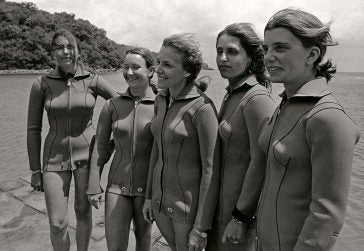
Fifty years ago, the National Aeronautics and Space Administration (NASA) wanted to see how humans might fare during long space missions. At the time, the best way to test this was by having humans live in habitats that were 15 meters underwater. They put out a request for applicants and found several very well-qualified women oceanographers with diving experience. Among the five women chosen for the Tektite2 Mission was Alina M. Szmant (Ph.D. 1980), then an M.S. student at Scripps Institute of Oceanography. Her story was recently recorded by the BBC Witness History Program. After the mission, the aquanauts were interviewed by the New York Times and asked if they would like to be astronauts? “That’s not our field,” said Szmant.“But if they discover oceans on the moon, I think I’d like to go.” Szmant was a keynote speaker at the Tektite 2020 Conference.
Miles Furnas (M.S. 1975, Ph.D.1982) writes from Australia: “Things are fine here in Townsville. We’re all battened down for COVID-19, but cases few and far between in this far- off neck of the woods, so it’s pretty benign for the while. Both my wife Grace (a veterinarian) and I are retired, doing retired stuff. I do some journal editing and some lecturing in biological oceanography at the local James Cook University. Both our daughters are down in Brisbane as is our one granddaughter. I’ve been doing scull and sweep rowing in racing shells for about 15 years. Lately I’ve gotten into beekeeping (European honeybees and stingless native bees).”
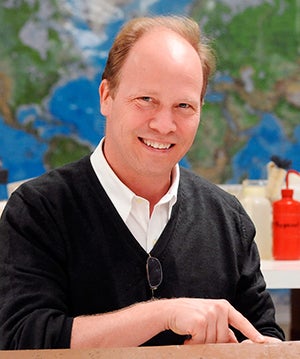 The Woods Hole Oceanographic Institution (WHOI) Board of Trustees selected a new President and Director, Peter de Menocal (M.S. 1986). De Menocal took up the new post on October 1, 2020. Fellow GSO alum Amy S. Bower (Ph.D. 1988) served as co-chair of the search committee. Prior to coming to WHOI, de Menocal was Dean of Science in the Faculty of Arts and Sciences, Thomas Alva Edison/Con Edison Professor, and founding director of the Center for Climate and Life at Columbia University’s Lamont-Doherty Earth Observatory. He is a prominent research scientist in the fields of paleoceanography and marine geology.
The Woods Hole Oceanographic Institution (WHOI) Board of Trustees selected a new President and Director, Peter de Menocal (M.S. 1986). De Menocal took up the new post on October 1, 2020. Fellow GSO alum Amy S. Bower (Ph.D. 1988) served as co-chair of the search committee. Prior to coming to WHOI, de Menocal was Dean of Science in the Faculty of Arts and Sciences, Thomas Alva Edison/Con Edison Professor, and founding director of the Center for Climate and Life at Columbia University’s Lamont-Doherty Earth Observatory. He is a prominent research scientist in the fields of paleoceanography and marine geology.
Amy S. Bower (Ph.D. 1988) writes: “Starting in August 2018, I took over as Department Chair in Physical Oceanography at WHOI, for a four-year term. Luckily, I have a talented research group that has successfully kept our projects moving ahead even though I’m distracted with administrative responsibilities. We were on the third R/V Armstrong cruise of the COVID-19 era, and just the second to venture into foreign waters (off Greenland). This involved a massive amount of extra planning and logistics compared to a normal cruise.” Bower’s husband David continues as manager of the Shipboard Scientific Services Group at WHOI. Her daughter Sara entered the University of Hartford this year, and Bower writes, “David and I spent some nice late summer days at our cottage in Boothbay Harbor in September. We kayaked past Tumbler Island, with fond memories of Steve Dickson’s (M.S. 1986) GSO gatherings there back in the 1980’s.”
1990s
 On September 14, Veronica Berounsky (Ph.D. 1990) and two swimmer friends swam the 6-mile (10km) length of Pettaquamscutt Estuary, known also as Narrow River. This “Source to Sea—the Narrow River Long Swim” raised over $2,000 for the Narrow River Preservation Association (NRPA) during its 50th year and highlighted the river as a wonderful place to swim. Berounsky also swam to raise awareness for “Donate Life” which encourages people to sign up to be an organ donor. Berounsky, a coastal ecologist, has been on the Board of NRPA for 30 years and is Vice President, and is also Chair of the Rhode Island Rivers Council. Fellow alums Jerry Prezioso (M.S. 1991), Walter Berry (Ph.D. 1987), and Steve (M.S. 1974) and Lynn (M.S. 1974) Hale, were safety kayakers for the swim.
On September 14, Veronica Berounsky (Ph.D. 1990) and two swimmer friends swam the 6-mile (10km) length of Pettaquamscutt Estuary, known also as Narrow River. This “Source to Sea—the Narrow River Long Swim” raised over $2,000 for the Narrow River Preservation Association (NRPA) during its 50th year and highlighted the river as a wonderful place to swim. Berounsky also swam to raise awareness for “Donate Life” which encourages people to sign up to be an organ donor. Berounsky, a coastal ecologist, has been on the Board of NRPA for 30 years and is Vice President, and is also Chair of the Rhode Island Rivers Council. Fellow alums Jerry Prezioso (M.S. 1991), Walter Berry (Ph.D. 1987), and Steve (M.S. 1974) and Lynn (M.S. 1974) Hale, were safety kayakers for the swim.
Carin Ashjian (Ph.D. 1991) was interviewed in the Boston Globe and the New York Times about her 4½ months on the research icebreaker Polarstern, which was intentionally stuck in the ice in the Arctic for the Multi-disciplinary Drifting Observatory for the Study of Arctic Climate, or MOSAiC, project [See “Going with the Floe”]. Originally, she was supposed to be there for only two months, but then the COVID-19 pandemic hit and the next group of scientists had to have a lengthy quarantine before they could relieve the previous group of scientists. Also on the project and spending time in the ice was fellow alum Robert Campbell (Ph.D. 1993).
This past July, James H. McKenna (Ph.D. 1996) joined the Massachusetts Maritime Academy as Dean of Undergraduate Studies. He writes: “A bit of a crazy time to jump into a new dean position but now I’m starting to settle in. We’ve adopted a reduced presence on campus (all singles in the dorms) with lab-intensive majors prioritized for on campus instruction. Most instruction is occurring remotely. We’ve had a couple of COVID positive cases, but we’ve been able to contain things. We’re all still holding our breath,though.”
Kathleen J. Vigness Raposa (M.S. 1998) gave a talk “Discovery of Sound in the Sea: Communicating underwater acoustics research” at the 2nd African Bioacoustics Community Conference on November 4, 2020. Earlier, Kathy co-created the award-winning educational website “Discovery of Sound in the Sea” (dosits.org). Kathy works at INSPIRE Environmental in Newport, R.I. as does fellow GSO alum Marisa Guarinello (M.S. 2009). Marisa has been with INSPIRE for almost five years and has always worked remotely which has allowed her to live in Hawaii, Arizona, Washington, Idaho and Maryland.
2000s
David Borkman (M.S. 2000, Ph.D. 2002), and the late GSO professor Ted Smayda mentored Summer Undergraduate Research Fellowship in Oceanography (SURFO) student Emily Slesinger in 2014, and with Ph.D. student Joe Langan and marine research scientist Barbara Sullivan-Watts they published the work in the Journal of Plankton Research, titled “Multi-decadal (1972–2019) Mnemiopsis leidyi (Ctenophora) abundance patterns in Narragansett Bay, Rhode Island, USA.” An article in ecoRI News based on the work noted the changes in the seasonal activities of ctenophores in Narragansett Bay.
Also at the NEERS meeting, Susan Adamowicz (Ph. D. 2002) finished her term as president. The NEERS President-Elect is Courtney Schmidt (M.S. 2009, Ph.D. 2014), who was NEERS Treasurer for six years.
In the June 2020 Chesapeake Quarterly, an article entitled “Detecting Chemical Clues: Researchers develop tracers to track water originating from septic systems,” highlights the work of Lora Harris (Ph.D. 2006 ) and others at the University of Maryland Center for Environmental Science’s Chesapeake Biological Laboratory (UMCES-CBL).“Local planners can use this information to prioritize investments from the Chesapeake Bay Restoration Fund into septic system upgrades,” said Harris.
An Associate Scientist with tenure in Physical Oceanography at the Woods Hole Oceanographic Institution, Magdalena Andres (M.S. 2001, Ph.D. 2008) was featured along with two other scientists in the short documentary “Beyond the Gulf Stream,” filmed aboard the WHOI-operated research vessel Neil Armstrong and produced by MADLAWMEDIA. It was shown at the 2020 Wood Hole Film Festival. “I think we have a responsibility to communicate science and the process of doing science to the public,” said Andres. “This film does a really nice job of capturing life at sea in the wintertime.”
2010s
Victoria Paris Sacks (M.S. 2010) is working at the U.S. Environmental Protection Agency as a Remedial Project Manager for Superfund cleanup in Region 2 (New York City). After many years as an environmental consultant at Ramboll in Chicago, she has transitioned to the regulatory side of sediment management and is enjoying living in the city while researching and coordinating the cleanup of contaminated sediment sites.
On October 3, marine scientist and ocean conservationist Anupa Asokan (M.O. 2012) [pictured at top] completed a 27-mile, stand-up paddle across Santa Monica Bay along the Los Angeles coastline. She was elected onto Surfrider’s National Board of Directors in February and was looking for a way to raise funds and awareness of the organization. She raised over $10,000 to support their important work protecting our ocean and coasts and making sure everyone can continue to access the beach.
Connor McManus (M.S. 2012, Ph.D. 2017) now Deputy Chief, R.I. Dept. of Environmental Management, Marine Fisheries, and GSO professor Jeremy Collie were awarded funding through Sea Grant’s 2020 American Lobster Initiative for “Early Life History of American Lobsters in Coastal Southern New England Waters.”
 Joshua T. Kelly (M.S. 2013) finished his Ph.D. in Geophysics at San Diego State University and UCSD Scripps Institution of Oceanography this Spring and has started a tenure track faculty position at California State University, Los Angeles in the Department of Geosciences and Environment.
Joshua T. Kelly (M.S. 2013) finished his Ph.D. in Geophysics at San Diego State University and UCSD Scripps Institution of Oceanography this Spring and has started a tenure track faculty position at California State University, Los Angeles in the Department of Geosciences and Environment.
After completing NOAA’s 2018-2020 Coastal Management Fellowship, Sierra M. Davis (M.S. 2017) accepted a full-time position as an Oceanographer with NOAA’s Center for Operational Oceanographic Products and Services (CO-OPS) based in Silver Spring, MD.
Corinne L Truesdale (M.S. 2018) is now a Principal Biologist with the R.I. Dept. of Environmental Management, Marine Fisheries. She joins fellow GSO alums (and Collie Lab graduates) Jason McNamee (Ph.D. 2008) and Conor McManus (M.S. Ph.D. 2018) at the DEM lab at Fort Wetherill in Jamestown, R.I.
M. Lubetkin (M.S. 2019) has continued working on the E/V Nautilus as a Science Manager for the Ocean Exploration Trust. From December 2019 to January 2020 they participated in a DSV Alvin and AUV Sentry-enabled research cruise aboard R/V Atlantis to the East Pacific Rise 9°50’N vent fields and made a short video, “Divergent Warmth,” from footage captured during this cruise. The film had its world premiere in August at the Maine Outdoor Film Festival and then was shown at the 2020 Woods Hole Film Festival where Lubetkin received the Directors’ Choice Award as “Emerging New England Filmmaker.”
2020s
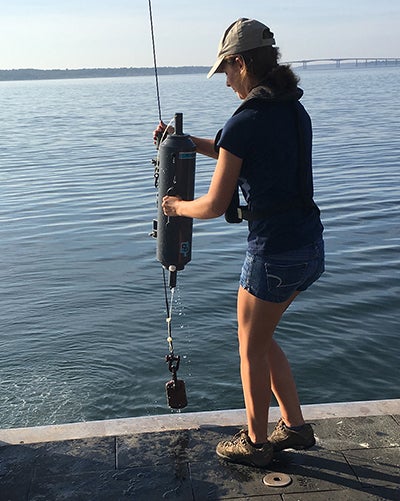 Jessica Carney (M.S. 2020) completed her degree with GSO Professor Colleen Mouw (M.S. 2003, Ph.D. 2009) this past summer, and finished her time as the phytoplankton time series assistant. She then headed off to a position as the Biogeochemical Coordinator at Florida Atlantic University-Harbor Branch Oceanographic Institute where her direct boss is Malcolm McFarland (M.S. 2001, Ph. D. 2014) who was also a phytoplankton assistant. James Sullivan (M.S. 1993, Ph.D. 2000) is FAU-HBOI’s Executive Director.
Jessica Carney (M.S. 2020) completed her degree with GSO Professor Colleen Mouw (M.S. 2003, Ph.D. 2009) this past summer, and finished her time as the phytoplankton time series assistant. She then headed off to a position as the Biogeochemical Coordinator at Florida Atlantic University-Harbor Branch Oceanographic Institute where her direct boss is Malcolm McFarland (M.S. 2001, Ph. D. 2014) who was also a phytoplankton assistant. James Sullivan (M.S. 1993, Ph.D. 2000) is FAU-HBOI’s Executive Director.
In Memoriam
J. Stanley “Stan” Cobb
Stan was responsible for the creation of the Marine Biology Program, one of URI’s most successful undergraduate programs.
J. Stanley “Stan” Cobb (Ph.D. 1969) died on April 24, 2020, after a long illness with Parkinson’s Disease and a short illness with COVID-19. Professor Cobb was a GSO alumnus, a long-standing faculty member in the University of Rhode Island’s Zoology Department, and Professor Emeritus in the College of the Environment and Life Sciences. Cobb attended Groton School and received a B.S. in biology from Harvard University in 1964. He was the first URI student of the late Howard Winn and received his Ph.D. at GSO in 1969. Then he was a post-doc at the Smithsonian Institution studying fish brains. He returned to URI in 1970 as a faculty member in the Department of Zoology where he remained throughout his career and was departmental chairman on two occasions. He was responsible for the creation of the Marine Biology Program, one of the most successful undergraduate programs at URI. Starting with his GSO dissertation on “Activity, growth and shelter selection of the American lobster,” Cobb was a pioneer in crustacean biology and was known for his work on lobster biology and management and spent a considerable time undertaking research in Narragansett Bay. He served on the committees of a number of GSO graduate students. He also served as a consultant to GSO’s Coastal Resources Center, helping to develop coastal marine institutions and programs in Ecuador, Sri Lanka and Indonesia. He retired in 2004 but continued to volunteer as a science advisor to the Paul Cuffee School in Providence and helped with the development of a marine science program on Hurricane Island, Maine. Despite his health problems, he remained active in his field, and was a published co-author as recently as 2017. He is survived by his wife Laurel Cobb, son Nathan, daughter Lisa and their families. See memories and tributes at www.forevermissed.com/jstanley-cobb. Donations in his memory may be given to the Stan Cobb Endowment for Marine Biology at the University of Rhode Island, in Kingston, R.I. (web.uri.edu/marbio/stan-cobb-field-courses).
J. Paul Dauphin
For nearly two decades, Paul was a critical part of the memorable and close NSF team overseeing the Ocean Drilling Program.
J. Paul Dauphin (Ph.D. 1983) passed away on May 23, 2020 from complications of chronic obstructive pulmonary disease (COPD) at 79 years old. Paul received his Ph.D. with Professor Ross Heath as his major professor with a dissertation entitled: “Eolian quartz granulomentry as a paleowind indicator in the northeast equatorial Atlantic, North Pacific and southeast equatorial Pacific”. At GSO he also worked with Professor Michael Bender on the Manganese Nodule Program (MANOP). He was a National Science Foundation (NSF) Program Director for many years and had a significant impact on the NSF Ocean Drilling Program (ODP) and the Integrated Ocean Drilling Program (IODP) that followed. Jamie Allen, NSF Ocean Sciences Program Manager, shared with me this remembrance of Paul: “Paul Dauphin was delightfully funny and usually quite jovial, with a spare speaking and leadership style that effectively got the point across (and bluntly, if needed!). Together with Bruce Malfait and Don Heinrichs, he was a critical part of the memorable and close NSF team overseeing the Ocean Drilling Program for nearly two decades. The extraordinary scientific accomplishments of ODP and the successful start of the successive and even more ambitious IODP give strong evidence of the foundational leadership and international diplomatic skill that all three provided the science community. Paul’s ability to resolve issues—to provide triage to unsolvable problems—reflects in part his experience as a U.S. Army Ranger medical corpsman.” Former GSO Dean Bruce Corliss notes “I have known Paul since graduate school days, and we crossed paths many times when he was at NSF. I admired his attitude and perspective and always enjoyed talking with Paul about the work he oversaw at NSF. He was highly regarded by oceanographers for his role in developing the drilling program and will be greatly missed.” There will be a celebration of his life after COVID in St. Johnsbury, Vt. He leaves behind his wife, LaWanda (who can be reached at lldauphin@gmail.com) and many friends and colleagues.
Gerald Lee Hoffman
Jerry trained a generation of GSO people on how to analyze for trace amounts of metals in atmospheric and marine samples.
Gerald Lee Hoffman, a post-doctoral fellow at GSO from 1971 to 1975, died in his sleep on October 2, 2020. He was married for 49 years to Eva Jernigan Hoffman (GSO Ph.D. 1976). Jerry received his Ph.D. with Robert Duce in the Department of Chemistry at the University of Hawaii in 1971. Bob Duce left Hawaii and came to GSO for a faculty position in 1970 and Jerry came to GSO as a post-doc about a year later. Also in Bob Duce’s research group at Hawaii was Eva Jernigan; she earned a M.S. in Chemistry in 1970. She moved to GSO for her Ph.D. with Bob Duce in the early 1970s. While Jerry and Eva were both at GSO their romance blossomed, and they married. Jerry made his professional reputation analyzing atmospheric samples for trace metals. He also taught a whole generation of GSO students how to use atomic absorption and neutron activation analysis and went to sea on the R/V Trident several times. He worked for Bob Duce, but was well known to GSO students of Schilling, Pilson, Kester and Swift. His sea duties included collection of sea slick samples from a rubber raft launched from the R/V Trident. His raft attracted sharks and sea fog. Former GSO Dean Bob Duce remarked: “Jerry was a fantastic guy and one of the most outstanding analytical chemists I have ever known. Eva is not exaggerating when she said that Jerry trained a generation of GSO people on how to analyze for trace amounts of metals in atmospheric and marine samples.” Following his service at GSO he worked at the EPA lab in Narragansett, R.I. and then the USGS lab in Denver, Colo. His wake has been postponed until such time it is safe to travel again. Condolences can be sent to his wife Eva Hoffman at 1189 Aspen Drive, Evergreen, Colo. 80439, 303-670-1283 or to hoffmanej940@cs.com
Joyce D. Kaine
Joyce worked for many years at GSO’s Accounts Payable. She and her husband also owned Top of the Dock bait shop in Narragansett.
Joyce D. Kaine, age 89, passed away peacefully at home on October 7th, 2020 with her daughters by her side. She was predeceased by Walter F. Kaine, her loving husband of 50 years. Born in Cleveland, Ohio, she was the daughter of William P. Schroeder and Margaret Weisend. She graduated Collinwood High School in Cleveland, Ohio and later attended Mount Saint Joseph College in South Kingstown, R.I. She was employed for many years at the University of Rhode Island, Graduate School of Oceanography in Accounts Payable in Fish Building. Along with her husband Walter (Hap), Joyce also owned and operated Top of the Dock bait shop in Narragansett. Joyce was an avid traveler and enjoyed making trips across the globe with her husband and family. Other passions include theater, reading, jazz and dancing. There was nothing she enjoyed more than spending time with her beloved grandchildren. Joyce is survived by Kimberly Kaine of Narragansett, Kendall and Peter Beckman of South Kingstown, her loving grandchildren Merai and Tayler Beckman of South Kingstown, her grand-pups Rhoda and Duke, and predeceased by grand-pup Hunter. There will be a celebration of life post-COVID-19. In lieu of flowers, please put on a mask and hug your loved ones. Condolences can be sent to her daughter Kimberly Kaine, Coastal Resources Center, Graduate School of Oceanography, University of Rhode Island, Narragansett R.I. 02882-1197 or to kkaine@uri.edu
Kenneth A Mooney
Ken served as co-manager of the Atmospheric Chemistry, Carbon Cycle, and Climate (AC4) Program at NOAA’s Climate Program Office.
Kenneth A Mooney (Ph.D. 1977), oceanographer, proponent of science research, highly respected program manager, mentor to many and champion for diversity passed away after a brief illness on August 17, 2020. Ken was born on November 26, 1942 in Paterson, N.J. Ken had a talent for math and science and graduated from Rensselaer Polytechnic Institute with a B. S. in Physics in June 1964, then went on to the graduate physics program at the University of Maryland working with Professor Alan Faller of the Institute for Fluid Dynamics and Applied Mathematics. Ken entered the Graduate School of Oceanography at the University of Rhode Island in 1970. He was friends with fellow graduate students Jim Yoder, Steve Piotrowicz, Bob Thunell and Bruce Corliss and had lunch almost every day at North Lab (Mosby’s) with Jim and others. Even then he was known for his boisterous laugh! His 1977 thesis under Professor Roger B. Dowdell is titled “A Barotropic Steady-State Model of the Circulation in the Gulf of Mexico.” Ken’s first job after leaving URI was as a civilian with the U.S. Coast Guard, working in the Oceanographic Unit located at the Navy Yard in Washington, D.C. Then Ken was selected as the first Program Manager for NOAA’s U.S. Tropical Ocean-Global Atmosphere (TOGA) Project Office. This position was the first of many in his career in NOAA which spanned four decades. In recent years, he served as co-manager of NOAA’s Climate Program Office’s Atmospheric Chemistry, Carbon Cycle, and Climate (AC4) Program. Ken’s NOAA colleagues noted that “Perhaps Ken’s greatest legacy stems from his years of mentoring and promoting the careers of scientists and managers around him. Ken took pride in developing those many careers.” A more detailed obituary that includes photos and place to leave comments can be found on the Climate Program Office website: https://cpo.noaa.gov/News/In-Loving-Memory-of-Dr-Ken-Mooney
Jean Carr Stutz
Prof Ted Smayda’s students will warmly remember Jean for being a de facto “older sister,” always there to help and support.
Jean Carr Stutz, 83, of Port Charlotte Fla. and formerly of Wakefield, R.I. passed away October 10, 2020. She was the daughter of the late Frank and Harriet Sherman Carr. Jean was a graduate of South Kingstown High School, class of 1955. She is survived by her loving husband, Eric J Stutz, twin daughters, Laurie J. LeBlanc of North Attleboro, Mass. and Nancy (Robert) Toth of Wakefield, R.I. She also leaves behind six grandchildren and six great grandchildren. Jean worked for many years as a research assistant at the University of Rhode Island Graduate School of Oceanography for the late GSO Professor Theodore Smayda. She worked in the Smayda lab bunker where she made all of the culture media that was used in Smayda’s lab and did other chores. Jean is warmly remembered by his students for being a de facto “older sister” to many of them, always there to help and support them and also sharing many conversations when they took a break from their research. Jean also helped train some of their dogs. In lieu of flowers, memorial donations may be made to Samaritan’s Purse, PO Box 3000, Boone, N.C. 28607. Condolences can be sent to her husband Eric Stutz at 22580 Ashton Ave, Port Charlotte, Fla. 33980
